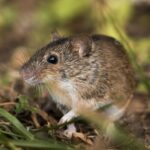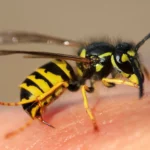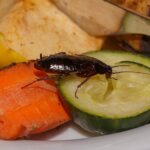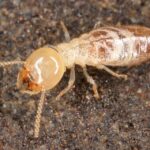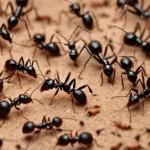Home » Pest Guide » Ants » House Ants
House Ants
House ants — commonly known as Odorous House Ants (Tapinoma sessile) — are one of the most common indoor pests across homes and restaurants. They earn their name from the rotten, coconut-like smell they release when crushed. These tiny black or brown ants invade kitchens, bathrooms, and pantries searching for sweets and moisture.
While they don’t sting or bite, odorous house ants form large, multi-queen colonies that can spread through walls and insulation, making infestations hard to eliminate without professional help.
What House Ants Look Like
House ants are small, typically 1.5 to 3 mm long, and dark brown to black in color.
They’re often mistaken for “sugar ants” or “grease ants,” but can be identified by their unique odor and fast, erratic movement.
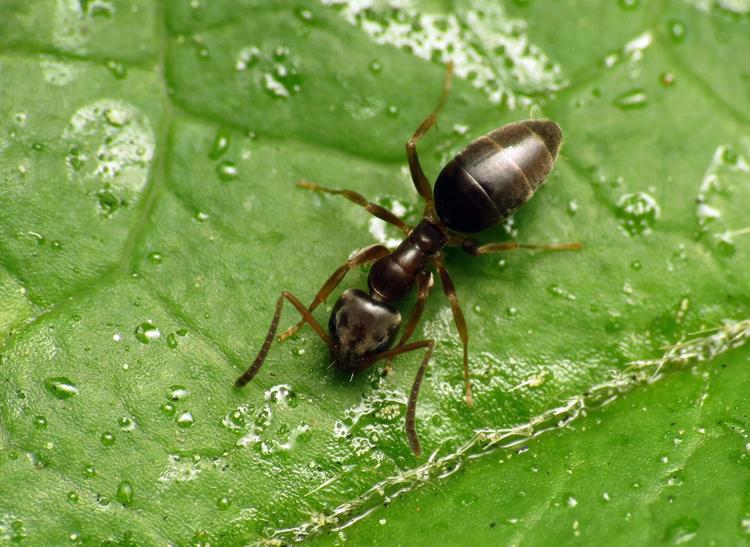
Identification checklist:
- Small, dark brown or black ants
- Uneven thorax (no spines)
- Emit a foul, rotten-coconut smell when crushed
- Active foragers along baseboards, sinks, and countertops
- Frequently appear after rain or high humidity
Behavior and Nesting Habits
Odorous house ants build large colonies with multiple queens and can relocate easily if disturbed.
They prefer warm, moist environments – nesting in wall voids, under floors, behind cabinets, or near plumbing lines.
Outdoors, they nest beneath mulch, logs, or rocks, then migrate inside during hot or wet weather.
Common nesting spots:
- Behind kitchen cabinets or dishwashers
- Beneath bathroom tiles or sinks
- Under potted plants or mulch beds
- Around leaking pipes or window frames
Signs of a House Ant Infestation
- Lines of small black ants on counters or walls
- Ant trails reappearing after cleaning
- Nests found near sinks or damp wood
- Sweet foods or pet dishes attracting ants
- A foul odor when ants are crushed
⚠️ If you notice recurring trails or odor after cleaning, there’s likely a large colony inside your walls. Contact us today >>
House Ant FAQs
Why do I keep getting ants in my kitchen?
Odorous house ants are attracted to sugar, grease, and water. Even minor spills or leaks can draw entire colonies indoors.
Do house ants bite or sting?
No. They don’t sting, and their bite is harmless — but they can contaminate food and surfaces.
What causes the bad smell when you crush them?
The odor comes from a chemical they release as a defense mechanism — often described as rotten coconut.
Will cleaning alone stop house ants?
Cleaning removes trails temporarily, but the colony will return unless the nest is treated directly.
How long does it take to eliminate a house ant infestation?
With professional baiting and monitoring, most infestations are controlled within 1–2 visits.
Get Your Free Ant Control Quote
Odorous house ants invade kitchens and leave behind a foul smell when crushed. Our interior ant control keeps them out for good.
Seeing ant activity around your home or business? Our licensed pest control specialists locate nests, eliminate entire colonies, and keep them from coming back. We use safe, targeted treatments that work for any type of ant — indoors or outdoors.
Don’t wait until the infestation spreads — request your free quote today and protect your property year-round.
Are House Ants Dangerous?
While odorous house ants aren’t harmful to humans, they can contaminate food and spread bacteria. Because colonies can relocate rapidly when threatened, surface sprays often scatter the infestation instead of eliminating it.
For lasting control, treatment must target the nest and queen colonies, not just visible workers. Contact us today >>
How to Get Rid of House Ants
DIY Steps:
- Wipe down surfaces and remove food residue.
- Seal cracks, baseboards, and window gaps.
- Fix leaks and reduce moisture in kitchens and bathrooms.
- Use sweet bait stations rather than sprays to reach hidden nests.
Professional Treatment:
Our house ant control specialists identify entry points, track foraging trails, and apply non-repellent baits that reach the entire colony — including hidden queens. We also provide follow-up inspections to prevent re-infestation.
Contact Us for House Ant Control >>
Prevention Tips
- Keep kitchens clean and dry.
- Store sweets and cereals in sealed containers.
- Fix plumbing leaks promptly.
- Trim vegetation touching exterior walls.
- Use dehumidifiers in basements or crawl spaces.
- Schedule seasonal pest inspections.

When to Call a Professional
If you’re seeing small ants daily — even after cleaning — the colony is likely established behind walls or under floors. DIY solutions rarely reach multiple nesting sites.
Our licensed pest technicians use targeted baits and barrier treatments to eliminate odorous house ants safely and prevent them from returning.
Do you have another Pest Issue?
What our Customers Say about Us!
Trustindex verifies that the original source of the review is Google. Great service for the price tbhTrustindex verifies that the original source of the review is Google. Goat services and didn’t have a problem ever sense.Trustindex verifies that the original source of the review is Google. Best service hands down!! As a first time customer, all I know is this they definitely got the job done and will be recommending them to everyoneTrustindex verifies that the original source of the review is Google. I been having a bugs everywhere and been terrified and they help me so much getting the bugs awayTrustindex verifies that the original source of the review is Google. Did an amazing job helping me with my ants .Trustindex verifies that the original source of the review is Google. I was having problems with my roaches in my house and they did a good job getting rid of emTrustindex verifies that the original source of the review is Google. this man does really good he killed all the pests in my house 😮🫡Trustindex verifies that the original source of the review is Google. Very accommodating for emergency service request. Also prompt in time for appointments. Great company!!Verified by TrustindexTrustindex verified badge is the Universal Symbol of Trust. Only the greatest companies can get the verified badge who has a review score above 4.5, based on customer reviews over the past 12 months. Read more


